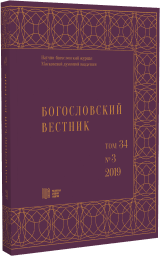Ambrosiaster’s Commentary on Romans: Features of the Biblical Text and Their Interpretation
DOI:
https://doi.org/10.31802/2500-1450-2019-34-39-54Keywords:
exegesis, Epistle to the Romans, Ambrosiaster, commentary on thirteen epistles of the Apostle Paul, Vetus Latina, Nova Vulgata, Cyprian type, original sinAbstract
The article discusses the biblical text and its commentary by the Roman inter- preter Ambrosiaster. The subject of the study is notable for the fact that it is the most significant fragment of the first ever in the history of Latin Christian literature full commentary on all the Epistles of the Apostle (except for Heb.). In addition, it is known that the work was widespread in medieval Europe. The main goal of the article is to indicate the peculiarities of the Ambrosiaster biblical text and to reveal their influence on the interpretation. The paper discusses how the biblical text of Ambrosiaster belongs to the main text types of the Vetus Latina, namely to the African Cyprian text. Based on a comparative analysis with the Nova Vulgata, the most signifi- cant discrepancies of meaning are highlighted, their volume estimated, and their influence on the interpretation of the biblical text by Ambrosiaster is described. It is shown that the volume of mutations can be estimated at 4-5 % of the total text volume. Some features of the biblical text lie at the foundation of Ambrosiaster’s opinion that the Apostle had repeatedly informed the Romans of his intention to visit them through third parties; death is a just consequence not only for those committing mortal sins, but also for those who patronage them. One of the variations in the biblical text serves as one of the reasons for the formation of Ambrosiaster’s original teaching on original sin, as committed by all of us in Adam. It is suggested in the paper that these features of Ambrosiaster’s Commentaries could be spread throughout Latin literature even after the unification of the biblical text. An example of such an influence is given in the writings of blessed Augustine.
Downloads
References
Источники
Ambrosiastri qui dicitur Commentarius in Epistulas Paulinas / ed. H. J. Vogels. Vindobonae: Hoelder-Pichler-Tempsky, 1966–1969. (CSEL; vol. 81/1–3).
Augustinus. Sancti Aureli Augustini De peccatorum meritis et remissione et de baptismo parvulorum ad Marcellinum libri tres; De spiritu et littera liber unus; De natura et gratia liber unus; De natura et origine animae libri quattuor; Contra duas epistulas Pelagianorum libri quattuor / ed. K. F. Urba et J. Zycha. Vindobonae: F. Tempsky, 1913. (CSEL; vol. 60).
Epistula ad Ephesios / ed. H. J. Frede. Freiburg: Herder, 1962–1964. (Vetus Latina; vol. 24/1).
Hieronymus. Epistulae I–LXX / ed. I. Hilberg, editio altera supplementis aucta curante M. Kamptner. Vindobonae: F. Tempsky, 1996. (CSEL; vol. 54).
Nestle-Aland Novum Testamentum Graece / ed. B. and K. Aland, J. Karavidopoulos, K. M. Martini, B. M. Metzger. Stuttgart: Deutsche Bibelgesellschaft,28 2012.
Nova Vulgata: Bibliorum Sacrorum editio (Vulgate Latin Bible) Sacros, Oecum. Concilii Vaticani II ratione habita, iussu Pauli PP. VI recognita, auctoritate Ioannis Paulis PP. II promulgata. Editio typica altera. Città del Vaticano: Libreria ed. Vaticana, 1986.
Литература
Алексеев А. А. Библия. IV. Переводы // ПЭ. М.: ЦНЦ «Православная энциклопедия», 2009. Т. 5. C. 120–200.
Кикин В., прот. Библейская и святоотеческая оценка учения о «наследовании» греха // ХЧ. 2013. № 3. С. 6–35.
Мецгер Б. Ранние переводы Нового Завета: Их источники, передача, ограничения / пер. с англ. С. Бабкиной. М.: ББИ, 2004.
Ambrosiaster’s Commentary on the Pauline Epistles: Romans / transl. S. A. Cooper, D. G. Hunter. Atlanta: SBL Press, 2017.
Freundorfer J. Erbsünde und Erbtod beim Apostel Paulus: Eine religionsgeschichtliche und exegetische Untersuchung über Römerbrief 5, 12–21. Münster: Aschendorff, 1927. (Neutestamentliche Abhandlungen; Bd. 13, 1-2).
Hunter D. G. The Significance of Ambrosiaster // Journal of Early Christian Studies. 2008. Vol. 17. P. 1–26.
Krans J. Who Coined the Name «Ambrosiaster»? // Paul, John, and Apocalyptic Eschatology. Studies in Honour of Martinus C. de Boer / ed. J. Krans et al. Leiden, 2013. (Supplements to Novum Testamentum; vol. 149). P. 274–283.
Lucas Franciscus Brugensis. Notationes in Sacra Biblia, quibus, variantia discrepantibus exemplaribus loca, summo studio discutiuntur. Antverpiae: Ex officina Chriftophori Plantini, Architypographi Regij, 1580.
Lunn-Rockliffe S. Ambrosiaster’s Political Theology. London: Oxford University Press, 2007.
Schelkle. K. H. Paulus, Lehrer der Väter. 2nd ed. Düsseldorf: Patmos, 1959.
Vogels H. J. Untersuchungen zum Text paulinischer Briefe bei Rufin und Ambrosiaster. Bonn: P. Hanstein, 1955. (Bonner biblische Beiträge; Bd. 9).








